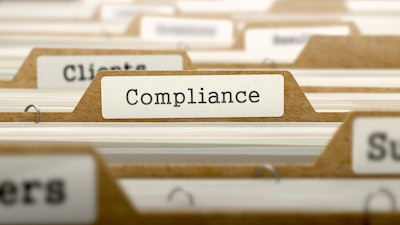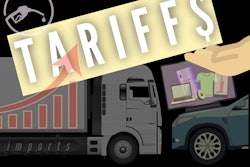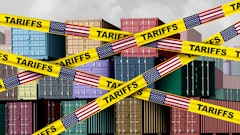
A growing number of states are advancing indirect source rules (ISRs) to address air pollution from warehouses and other logistics facilities, and associated truck traffic. These regulations aim to reduce emissions for heavy-duty vehicles that frequently visit facilities by increasing compliance costs and shifting toward zero-emissions logistics operations. Warehouse owners and operators must comply regardless of the industry in which they operate.
The South Coast Air Quality Management District (SCAQMD) in California set the precedent with Rule 2305—the Warehouse Indirect Source Rule (WAIRE)—which applies to large warehouse facilities in the greater Los Angeles area. Rule 2305 requires facilities of 100,000 square feet or more to earn “WAIRE Points” through a menu of mitigation strategies such as utilizing zero-emission trucks, installing solar panels, or paying mitigation fees. The rule was designed to mitigate the health and environmental impacts of freight activity, especially in overburdened communities.
Following this lead, multiple other jurisdictions are now considering similar programs or regulations. These include both legislative proposals and regulatory initiatives at the state level, with varying scopes and implementation models. Efforts have stalled following opposition during this year’s legislative sessions, but remain a threat to warehouse and logistics operators in California, Colorado, New York, and New Jersey.
California – Statewide ISR proposal becomes two-year bill
Assembly Bill 914, introduced in February, would expand ISR authority statewide by requiring the California Air Resources Board (CARB) to adopt regulations for indirect emissions such as from warehouses, ports, and rail yards. The bill would also establish a statewide reporting program and prioritize pollution mitigation in disadvantaged communities. While the bill passed initial committee hurdles, it has now been designated a two-year bill, effectively delaying further action until 2026.
California is expected to leverage ISRs as another means of achieving emissions reductions, especially following the failure of the state’s recent regulations to obtain federal approval such as CARB’s Advanced Clean Fleets regulation, which had attempted to force certain heavy-duty fleets to electrify. AB 914’s broad framework includes compliance options like truck fleet electrification, onsite solar and EV charging infrastructure, and payment into mitigation programs. It also proposed sensitive receptor protections, green building standards, and extensive reporting requirements. While support remains strong among environmental advocates, the legislative pause means businesses have more time to assess its potential implications and engage with lawmakers around problematic provisions.
New York – Proposed ISR legislation fails this session
New York Senate Bill S1180A, introduced on Jan. 8, would have required the Department of Environmental Conservation (DEC) to develop a program regulating emissions from warehouse operations larger than 50,000 square feet. The bill would have required a points-based system similar to SCAQMD’s WAIRE program but added numerous other requirements, and it failed to pass the NY Assembly before the 2025 legislative session adjourned.
Warehouse and logistics operators should remain vigilant for a similar bill to be introduced in the next session. S1180A was filled with problematic requirements ranging from burdensome reporting —such as heat maps of truck routes—to employee notification requirements and requiring DEC to move toward implementing low- and zero-emissions “zones” for medium- and heavy-duty vehicles.
Colorado – Regulatory exploration
Colorado’s Regional Air Quality Council (RAQC) formed an Indirect Sources Technical Work Group to explore the development of an ISR targeting warehouses and potentially retail sales facilities. The work group continues to review potential frameworks for implementing an ISR and is assessing the potential benefits and challenges of establishing a program in the Denver Metro/North Front Range area. While no formal rule has been proposed, this effort reflects growing regional interest in regulating freight-related pollution and exploring ISR frameworks modeled on Rule 2305 and presents continuing opportunity for stakeholder engagement to help shape the proposal.
New Jersey – Legislative initiative in progress
New Jersey Senate Bill S3546, introduced on Sept. 12, 2024, would require certain high-traffic facilities, including warehouses, to obtain permits from the Department of Environmental Protection (DEP) and annually implement measures to reduce air pollution caused by the facility. The bill aims to address pollution from facilities that generate significant truck traffic, particularly in overburdened communities. It appears to draw from California’s SCAQMD Rule 2305 and seeks to implement similar indirect source review programs to mitigate emissions associated with warehouse operations.
Key business impacts
For companies operating warehouses and logistics networks, these ISR initiatives signal a significant shift in environmental compliance requirements. While California's statewide expansion has been delayed and New York’s bill failed this year, these developments still represent momentum toward broader adoption of ISR frameworks, which include:
- High compliance costs for diesel truck operations, which are intended to incentivize vehicle electrification and related infrastructure, and solar deployment.
- Operational changes, including route planning, driver education, and trip tracking.
- Permitting and reporting with more rigorous state oversight and data disclosure.
ISR discussions are far from over. Businesses—especially those with national supply chains—should prepare for ISR policies to play a growing role in shaping freight logistics and environmental compliance obligations. Stakeholder participation in public comment and policy shaping is critical.


















